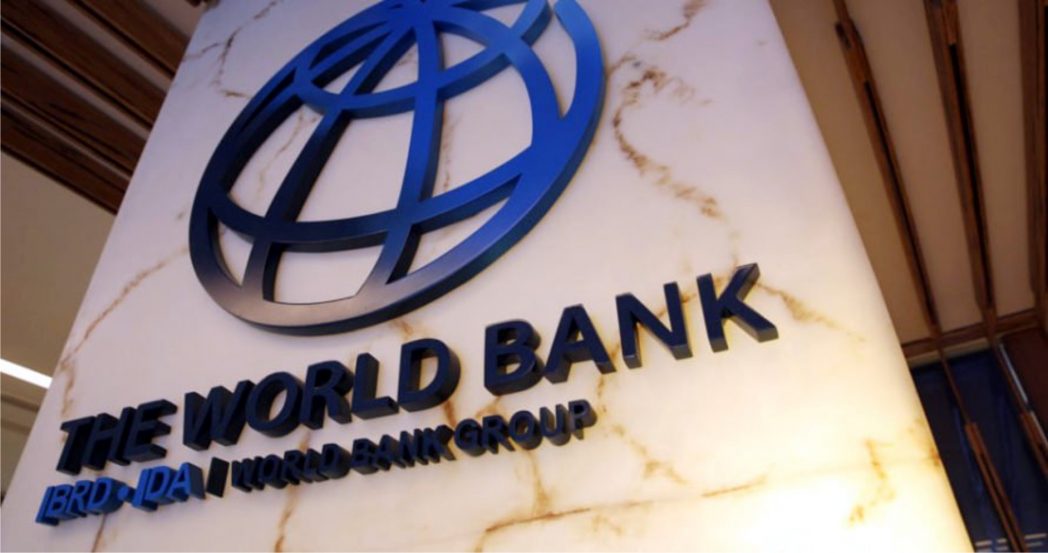News
$114.28m World Bank Loan: SERAP Demands Public Scrutiny, Transparency In Spending

Following World Bank’s approval of $114.28million credit and grant to fight Covid-19 in Nigeria, the Socio-Economic Rights and Accountability Project (SERAP) has asked the global financial institution to prevail on the federal and 36 state governors to accept voluntary scrutiny by Nigerians and civil society regarding the spending of the funds.
SERAP, in an open letter to the World Bank President, Mr. David Malpass, dated August 8, 2020, and signed by SERAP Deputy Director, Kolawole Oluwadare, said “the Nigerian government must be made to publicly commit to transparency and accountability in the spending of the fund, including by publishing details on a dedicated website.
“Details of how they will spend the money to buy medical equipment, and improve access to clean water, sanitation and hygiene, must also be made public”, SERAP demanded.
The World Bank Board of Directors, had last Friday, approved $114.28million financing “to help Nigeria prevent, detect and respond to the threat posed by Covid-19 with a specific focus on state level responses.”
According to the bank, the $100million credit with Project ID number: P173980, is due to be paid back over 30 years, with additional five years grace period.
But SERAP in its letter said “The World Bank has a responsibility to ensure that federal authorities and state governments are transparent and accountable to Nigerians in how they spend the approved credit and grant.
“The bank should tread carefully in the disbursement of funds or distribution of resources to states if it is to reduce vulnerability to corruption and mismanagement.”
SERAP expressed “serious concerns that the money and resources may be stolen, diverted or mismanaged by state governors without effective transparency and accountability mechanisms, especially given increasing reports of allegations of corruption and mismanagement of Covid-19 funds by agencies of the Federal Government and state governments, and impunity of perpetrators.”
SERAP said: “Insisting on transparency and accountability would ensure repayment of the credit, and protect the project objectives and intended purposes for which the funds and resources are approved, disbursed and distributed.”
According to SERAP, “The Bank’s power to provide credits and grants is coupled with a fiduciary responsibility to ensure that governments spending such funds meet international standards of transparency and accountability, including those entrenched in the UN Convention against Corruption to which Nigeria is a state party.”
The letter copied to the World Bank Country Director for Nigeria, Shubham Chaudhuri, read in part: “Implementing these recommendations would prevent a repeat of alleged diversion and mismanagement of recovered Abacha loot disbursed by the Federal Government to state governments.
“The World Bank should make clear to all the governors that it will cancel the credit and grant should they renege on their transparency and accountability commitments to spend the money and use the resources exclusively for Covid-19 related projects, and not to steal, divert or mismanage them.”
“As the level of Federal Government monitoring of the spending of the credit and grant and use of the resources by state governors may be based on political considerations, the bank’s influence might be the only restraining force state governors will take seriously.
“SERAP encourages you and the World Bank in any future engagements with state governments in Nigeria to insist on accessing information on how governors are spending security votes, and the amounts of public funds states are allocating to pay former governors life pensions, among others, as well as consider the level of corruption within each state before approving any credits and grants.
“SERAP also encourages you and the World Bank not to sacrifice international standards of transparency and accountability in the rush to provide Covid-19 credit and grant to the 36 state governments.
“According to our information, the World Bank Board of Directors on Friday, August 7, 2020 approved $114.28million financing ‘to help Nigeria prevent, detect and respond to the threat posed by Covid-19 with a specific focus on state level responses’.
“This includes $100million credit from the International Development Association (IDA) and $14.28million grant from the Pandemic Emergency Financing Facility.
“SERAP notes that the Government of Nigeria is expected to disburse the money and distribute the resources to the 36 state governments and the Federal Capital Territory (FCT) as ‘immediate support to break the chain of Covid-19 local transmission and limit the spread of Coronavirus through containment and mitigation strategies.’
“The approved money will also ‘help to finance federal procurements of medical equipment, laboratory tests, and medicines to be distributed to the states based on their needs, and to provide support to laboratories for early detection and confirmation; equipping and renovating isolation and treatment centres, including community support centres; and improving in patient transfer systems through financing of ambulances and training’.”
SERAP, therefore, urged Malpass and the World Bank to: “Disclose and widely publish the terms and conditions of the credit and grant, and the exact amount repayable by Nigeria in 30 years’ time, including the details of the interest, if any; and the consequences of Nigeria defaulting.
“To also ask President Muhammadu Buhari to instruct the Economic and Financial Crimes Commission (EFCC) and the Independent Corrupt Practices and Other Related Offences Commission (ICPC) to jointly track and monitor spending of the credit and grant by state governments; ask state governments to allow the media to freely report on their spending of the funds and use of the resources, and not to clampdown on journalists and the media in the exercise of their constitutional responsibilities to expose corruption and hold governments to account.
“To also ask state governments to explicitly commit to encouraging and protecting whistle-blowers as a way of ensuring that the funds and resources are not stolen, diverted or mismanaged; clarify if any, to the Bank’s knowledge and information, the credit and grant have been approved by Nigeria’s National Assembly pursuant to its constitutional duties, including its oversight functions under Section 88 of the 1999 Constitution (as amended).
“Ensure increased transparency of sanctions and terms and conditions of the credit and grant to each state to enable Nigerians to ask questions as to the spending of the money and use of the resources from their state governments.”
News
Fubara Tasks Nigeria’s Surveyor-General On C of O …Says Surveyors’ Role Pivotal In Governance

Rivers State Governor, Sir Siminialayi Fubara, has expressed concern over certain unprofessional practices within the surveying profession, urging practitioners to address issues surrounding the acquisition of Rights of Way and seismic operations in the State.
The governor also raised strong objections to what he described as threats to land ownership and title in the State through the alleged issuance of Federal Certificates of Occupancy by the Office of the Surveyor-General of the Federation and other affiliated federal agencies.
According to him, such actions are contrary to Section 1 of the Land Use Act, Cap L5, Laws of the Federation of Nigeria 2004, which vests all land within a state in the Governor as trustee on behalf of the people.
Fubara made the remarks while speaking as Special Guest at the National Conference of the Association of Private Practicing Surveyors of Nigeria (APPSN), a sub-group of the National Institute of Surveyors (NIS), held at the Obi-Wali Cultural Centre, Port-Harcourt, yesterday.
Represented by the Secretary to the State Government, Dr Benibo Anabraba, the governor also expressed concern over the problem of land grabbing through illegal survey plans and the payment of inadequate compensation to landowners during compulsory land acquisition for oil and gas exploration by licence holders, urging surveyors to uphold professionalism and fairness in their practice.
He said such illegal activities negatively affect the development of the State.
Fubara urged surveyors to promote ethical and sustainable planning practices that protect the environment, including the preservation of green spaces, marine areas, and forest reserves.
He described the role of surveyors as pivotal to the growth, development, peace, and orderly governance of any society.
According to him, the services of surveyors are critical to physical and urban planning, housing development, land administration, and the provision of infrastructure.
He stressed that surveyors play indispensable roles in land use and management, infrastructure provision, environmental management, and conflict resolution, noting that their presence in government ministries, departments, and agencies ensures adherence to best practices.
“The role of surveyors in governance is pivotal to the growth, development, peace, and order of society, particularly in land administration, infrastructure development, environmental management, and conflict resolution,” the governor said.
He noted that the conference theme, “Mapping the Future: The Vital Roles of Surveyors in the Nigerian Oil and Gas Industry,” was particularly significant to Rivers State, given its position as the hydrocarbon heartbeat of the nation.
The President of the Nigerian Institution of Surveyors (NIS), Surv. Pius Eze, urged all participants to optimize the opportunity provided by the conference for professional upgrading and networking, adding that the conference displays consistency of vision and dedication to the welfare of private practitioners.
The National Chairman of APPSN, Surv. Simepiriye Kalio, thanked leaders and members of the association for their sacrifices to achieving the successes recorded.
The Chairman of APPSN, Rivers State chapter, Surv. Andy Nwikinane, said that the association was working with relevant stakeholders to prevent the infiltration of quacks in the profession.
News
African Leaders Should Be Under 50 -Jonathan

Former President Goodluck Jonathan has called for a generational shift in African leadership, urging countries across the continent to deliberately promote younger leaders between the ages of 25 and 50.
According to him, younger leaders are more physically and mentally equipped for the rigours of modern governance.
Jonathan made the call in Abuja, yesterday, at the International Memorial Lecture and Leadership Conference marking the 50th anniversary of the assassination of former Head of State, General Murtala Ramat Muhammed.
Reflecting on the demands of leadership, the former president recalled that while in office, he sometimes had no more than two hours of sleep in 24 hours, stressing that advanced age can limit the capacity to cope with the pressures of governance.
“Why do we begin to think that you must be a hundred years old before you can rule your country?” Jonathan asked.
He noted that leadership requires unusual stamina and resilience, arguing that younger leaders are better positioned to withstand the pressure.
“If they need to stay awake for 24 hours, they can stay awake for 24 hours. When I was in office, some days I did not sleep up to two hours. If you subject an older person to that kind of stress, the person will spend 50 per cent of the time in hospital,” he said.
Jonathan aligned his position with the spirit of Nigeria’s “Not Too Young To Run” movement, which seeks to lower age barriers for elective offices and encourage youth participation in politics.
“I have to reinforce the Not Too Young To Run movement. We have to bring some of these age limits down. If we are looking for people who can run nations in Africa, we should look within the 25 to 50 age bracket. That is when you can be very vibrant, physically strong and mentally sound,” he said.
He also questioned the practice of some public office holders spending extended periods outside their states or countries.
“In a country like the United States, some governors do not leave their states for four years. But here, some of our governors spend 50 per cent of their time outside. So who runs the state? Why will we not have security problems? Coming of age must transcend many things. First and foremost, we must have the discipline to manage ourselves,” he added.
Reflecting on the legacy of General Murtala Muhammed, Jonathan said the late leader demonstrated that age was not a barrier to decisive and visionary leadership. Muhammed became Head of State at 38 and, despite ruling for only 200 days, left a lasting impact.
“General Murtala Muhammed assumed office at the very young age of 38. Despite a tenure of only 200 days, his achievements were profound because he was driven by a clear, unyielding vision.
“His leadership sent a clear message: leadership was to serve the national interest, not personal ambition,” Jonathan said.
The former president also referenced other Nigerian leaders who assumed office at relatively young ages, including General Yakubu Gowon, who became Head of State at 32 and later introduced the National Youth Service Corps, which remains in existence to this day.
“Young man of 32 managed to pull the country through the civil war. So why do we now think leadership must only come at old age?” he asked.
However, Jonathan cautioned that youth alone is insufficient without discipline, patriotism and strong institutions.
While praising Muhammad’s decisiveness, he stressed that democracy depends more on institutions than on individuals.
“Democracy requires vision rather than decree. It requires persuasion instead of command. It depends on institutions, not individuals. Above all, it requires respect for the rule of law and the willingness to submit power to the will of the people,” he said.
He urged African leaders to view governance as stewardship rather than entitlement and encouraged young people to see leadership as service.
“Young people must see leadership as service, not entitlement. Leaders must see governance as stewardship, not a right,” he said.
“I sometimes remember when I contested as a deputy governorship candidate. You had to be 40 years old before you could even be a senator, a deputy governor or a governor, not to talk about president. Yet the Head of State we are celebrating today assumed office at 38,” he added.
Calling on Nigerians and Africans to draw lessons from history, Jonathan said leadership should be measured by impact rather than duration in office.
“As we mark 50 years of General Murtala Muhammed’s legacy, let us remember that leadership is not measured by how long you govern; it is measured by the courage to act decisively when the nation needs direction and by the impact you make on society,” he said.
He emphasised that while military leaders govern by command and authority, democracy demands a different approach anchored on strong institutions, credible electoral bodies, an independent judiciary, well-trained security agencies and accountable governance systems.
“While General Murtala Muhammed symbolised decisive leadership, our democratic future depends on strong institutions. Democracy requires vision rather than decree. It requires persuasion instead of command. It depends on institutions, not individuals. Democracy also demands restraint and respect for the rule of law,” Jonathan said.
News
Police Bust Kidnapping Syndicate In PH
The Rivers State Police Command has confirmed the arrest of two men linked to a criminal syndicate that lured, kidnapped, and robbed women working as “run girls” in Port Harcourt hotels.
The suspects, 27-year-old Albert Koko-Ete Hanson and 18-year-old Wisdom Okon from Abak Local Government Area of Akwa Ibom State, were apprehended after victims reported the crimes to hotel security.
One of the victims, simply identified as Faith, told the police that she was invited to a hotel under the pretense of a client request and was led to a two-bedroom apartment where the suspects were staying.
She said the suspects showed her a photograph of another woman, whom they claimed was owing them N5 million, and demanded her phone password to access her bank account. Her phone was seized, though she had no money in her account.
Faith also alleged that another female victim had already been tied and blindfolded in a bathroom, and both were later stripped and sexually assaulted, with threats of organ harvesting reportedly made by the suspects.
It was learnt that a third victim alerted friends in the hotel via text message while the suspects tried to access her bank app. The quick action of the hotel security team led to the rescue of all the three victims.
The prime suspect, Albert Koko-Ete, reportedly confessed to the crimes and revealed that he had been operating the syndicate for six years, earning over N18 million naira.
Rivers State Police Public Relations Officer, CSP Grace Iringe-Koko, warned young women against engaging in prostitution, citing the high risks involved.
Iringe-Koko advised women to acquire skills and seek legitimate means of income, revealing that the syndicate specifically targeted women with high-end devices such as iPhone 15 and above.
The Police confirmed that the suspects’ method involved identifying women they could abduct to extort money from them or their relatives.
The Police said the suspects remain in custody and will be arraigned in court once investigations are complete.
The Command reiterated its commitment to protecting citizens and dismantling criminal networks preying on vulnerable individuals.
King Onunwor
-

 Politics2 days ago
Politics2 days agoAPC Releases Adjusted Timetable For Nationwide Congresses, Convention
-

 Business2 days ago
Business2 days agoCustoms Seek Support To Curb Smuggling In Ogun
-
Sports2 days ago
DG NIS Wants NSC Board Constituted, Seeks Increased In Funding
-
News2 days ago
Police Bust Kidnapping Syndicate In PH
-
Sports2 days ago
NSC Disburses N200m Training Grants To 26 Athletes
-

 Sports2 days ago
Sports2 days agoSWAN Rivers Set-up Five Functional Committees
-
Sports2 days ago
‘NTF Will Build On Davis Cup Success For Brighter Future’
-
Sports2 days ago
Falcon Players Prepare For Title Defense









